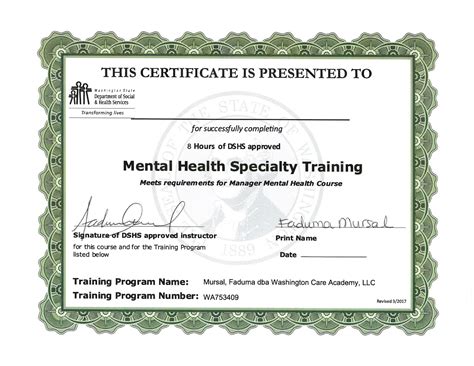Top 10 Behavioral Health Certifications For Growth

Behavioral health, also known as mental health, is a critical field that focuses on understanding and treating mental disorders and promoting overall well-being. With the increasing demand for mental health services, professionals in this field can greatly benefit from obtaining specialized certifications that demonstrate their expertise and commitment to providing quality care. In this article, we will explore the top 10 behavioral health certifications that can help professionals enhance their knowledge and skills, and open up new opportunities for growth and advancement.
1. Licensed Professional Counselor (LPC)
The Licensed Professional Counselor (LPC) certification is one of the most recognized and respected credentials in the field of behavioral health. LPCs are trained to assess, diagnose, and treat individuals with various mental health conditions. This certification requires a master’s degree in counseling or a related field, completion of a certain number of supervised clinical hours, and passing a licensing exam.
2. Certified Addiction Counselor (CAC)
The Certified Addiction Counselor (CAC) certification is specifically designed for professionals working in the field of substance abuse and addiction. CACs are trained to provide counseling and support to individuals struggling with drug or alcohol addiction. This certification typically requires a bachelor’s degree in a related field, completion of specific coursework, and passing a certification exam.
3. Board Certified Behavior Analyst (BCBA)
The Board Certified Behavior Analyst (BCBA) certification is a highly specialized credential for professionals working with individuals with autism spectrum disorders and other developmental disabilities. BCBA-certified professionals are trained to conduct behavioral assessments, develop treatment plans, and implement behavior intervention strategies. This certification requires a master’s degree in behavior analysis or a related field, completion of supervised experience, and passing a certification exam.
4. Certified Mental Health Counselor (CMHC)
The Certified Mental Health Counselor (CMHC) certification is designed for professionals who provide counseling and support to individuals with mental health disorders. CMHCs are trained to assess, diagnose, and treat various mental health conditions. This certification typically requires a master’s degree in counseling or a related field, completion of supervised clinical experience, and passing a certification exam.
5. Certified Clinical Mental Health Counselor (CCMHC)
The Certified Clinical Mental Health Counselor (CCMHC) certification is an advanced credential for professionals who specialize in providing clinical mental health counseling services. CCMHCs are trained to diagnose and treat individuals with complex mental health conditions. This certification requires a master’s degree in counseling or a related field, completion of supervised clinical experience, and passing a certification exam.
6. Certified Rehabilitation Counselor (CRC)
The Certified Rehabilitation Counselor (CRC) certification is specifically designed for professionals working with individuals with disabilities. CRCs are trained to provide counseling, support, and advocacy to help individuals with disabilities overcome barriers and achieve their personal and vocational goals. This certification typically requires a master’s degree in rehabilitation counseling or a related field, completion of supervised clinical experience, and passing a certification exam.
7. Certified Eating Disorder Specialist (CEDS)
The Certified Eating Disorder Specialist (CEDS) certification is geared towards professionals who specialize in the treatment of eating disorders. CEDS-certified professionals are trained to assess, diagnose, and treat individuals with anorexia, bulimia, binge eating disorder, and other eating disorders. This certification requires a master’s degree in a related field, completion of specific training and clinical experience, and passing a certification exam.
8. Certified Trauma Specialist (CTS)
The Certified Trauma Specialist (CTS) certification is designed for professionals who work with individuals who have experienced trauma. CTS-certified professionals are trained to provide trauma-informed care and evidence-based treatments to help individuals heal from traumatic experiences. This certification typically requires a master’s degree in a related field, completion of specific training and clinical experience, and passing a certification exam.
9. Certified Psychiatric-Mental Health Nurse Practitioner (PMHNP)
The Certified Psychiatric-Mental Health Nurse Practitioner (PMHNP) certification is for advanced practice nurses who specialize in providing mental health care. PMHNPs are trained to assess, diagnose, and manage mental health disorders, prescribe medications, and provide psychotherapy. This certification requires a master’s or doctoral degree in psychiatric-mental health nursing, completion of supervised clinical hours, and passing a certification exam.
10. Certified Peer Specialist (CPS)
The Certified Peer Specialist (CPS) certification is for individuals who have personal experience with mental health challenges and recovery and want to use their lived experience to support others on their journey to wellness. CPS-certified individuals receive training in peer support techniques, advocacy, and self-help strategies. This certification typically requires completion of a peer specialist training program and passing a certification exam.
Conclusion
Obtaining a behavioral health certification can significantly enhance a professional’s career prospects and provide opportunities for personal and professional growth. Whether it’s specializing in a specific area of mental health, such as addiction or trauma, or advancing in a particular role, such as counselor or nurse practitioner, these certifications demonstrate a commitment to providing high-quality care and staying current with the latest research and best practices in the field.
Frequently Asked Questions
- What are the benefits of obtaining a behavioral health certification?
Obtaining a behavioral health certification can enhance your knowledge and skills, increase your career opportunities and earning potential, and demonstrate your commitment to providing quality care.
- How do I choose the right certification for me?
Consider your career goals, interests, and the population you want to work with. Research the requirements and scope of practice for different certifications to find the one that aligns with your goals.
- Are these certifications recognized nationally?
Yes, these certifications are recognized nationally and often required or preferred by employers in the behavioral health field.
- Do I need a graduate degree to obtain these certifications?
Many of these certifications require a graduate degree in a related field, such as counseling or nursing. However, there are also certifications available for individuals with a bachelor’s degree or specific training.
- How do I maintain my certification once I obtain it?
Most certifications require ongoing professional development, continuing education, and adherence to a code of ethics to maintain certification. Be sure to check the specific requirements for each certification.

